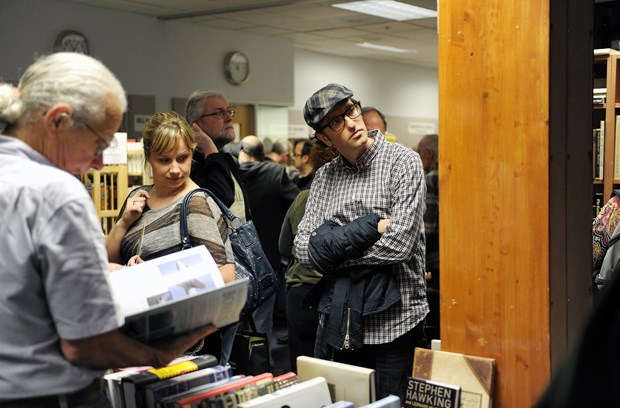Thrown on top of Art of the Avant-Garde in Russia journal was a copy of The Fairly Incomplete and Rather Badly Illustrated Monty Python Piano Song Book, neither of which book collector Gordon Kibble was particularly interested in.
Instead, Kibble, who was third in line to get in to the 2013 Vancouver Book Fair this past weekend at the UBC Robson Square, dashed for the Ainsworth Books stall and within five minutes bought a decades-old The Tragic Story of the Empress of Ireland, which included stories about “other great naval disasters.”
Kibble pointed to other books propped up on the table-top shelving. Military books, books about British Columbia history, railway books and, “Now here’s a rare one,” he said, opening a book about World War I, all written in German. “I don’t read German but you can tell by some of the words used — torpedieren — that it’s all about battles of the naval fleet. You do not walk into your local book store where something like this calls out, ‘Here I AM!’”
And that’s why the Vancouver Book Fair drew a steady crowd all day long; people bound by the love of the magic of an old book.
Twenty-four dealers brought their antiquarian, collectable and rare books, and the classroom-sized space was filled with well-traveled words. (Don Stewart of the venerable MacLeod’s Books said he has sometimes seen the same book come back to him two or three times during his 41 years of business. “It’s like seeing an old friend,” he said.)
The printed word is becoming a rarity, particularly in cities where living space is at a premium. Books, much like compact discs for music, are packed off to the thrift shop, leaving behind a digital file of convenience, an invisible presence until a button is turned on.
Pam Cohen and Gary Abbott, first and second in Saturday morning’s book fair line-up respectfully, are both avid collectors. Cohen collects children’s books, focused on the illustrations. “I’m a book lover,” she said. “Still like the feel of a real book, the actual physical page. Also, you can’t see an illustration as well on the computer screen as you do on the printed page.”
Abbott, who has anywhere between 1,800 to 2,000 books in his collection, is here for the first editions because later versions often change with omissions, he said. “My reason to collect is to go back to the original source, the original documentation. It’s like telling a story... by the time it gets to the fifth person, the story has changed.”
Cohen interrupts good naturedly, “Got any stone tablets?”
The Vancouver Book Fair represents a good chunk of the used sellers in town, including a couple suburban dealers as well as two from Winnipeg and a lone seller from Toronto. The fair was started, resurrected rather, by Richard Hopkins of Hourglass Books three years ago after dying in the 1980s when cross-border legislation made it near-impossible for American dealers to participate (part of the law was that they had to leave the cash equivalent to their collections with customs — a formidable request considering some books are worth thousands of dollars).
“It’s a fascinating trade,” said Hopkins. “The most important thing is bringing a sense of community. There’s a lot of guys who have been in the business for a long time and, as one dealer said, this gives them a chance to hang out with the other old farts.”
Proof of the community building: Hopkins was the only seller with his books in cardboard boxes as he gave his shelving to another dealer for the weekend.
Three hours after Saturday’s fair started, Kibble reached his self-imposed maximum purchase allowance of one full backpack. But room wasn’t the only thing stopping him from a find — a several volume collection of books by Captain George Vancouver had a $70,000 price tag.
“You’ll find the mundane and the things you’ve seen before,” he said. “But there are the treasures in between. Layer upon layer of treasures.”



